Ethics and Professional Practice: ICT Ethics and Deontology Analysis
VerifiedAdded on 2023/01/18
|10
|2378
|27
Essay
AI Summary
This assignment delves into the ethical dimensions of information and communication technology (ICT), using the 2018 Facebook-Cambridge Analytica data scandal as a primary case study. The analysis examines violations of ethical codes, including informed consent, privacy, and data trustworthiness. It critiques the actions of Facebook and Cambridge Analytica through the lens of philosophical ethics. The assignment further compares and contrasts the Australian Computer Society (ACS) Code of Ethics with the ACM Code of Ethics and Professional Conduct, highlighting similarities and differences with examples. Finally, it critically assesses the concepts of Act Deontology and Rule Deontology, discussing their strengths and weaknesses, and applying them to real-world scenarios to illustrate the complexities of ethical decision-making. The document references various sources to support the arguments and analysis presented.
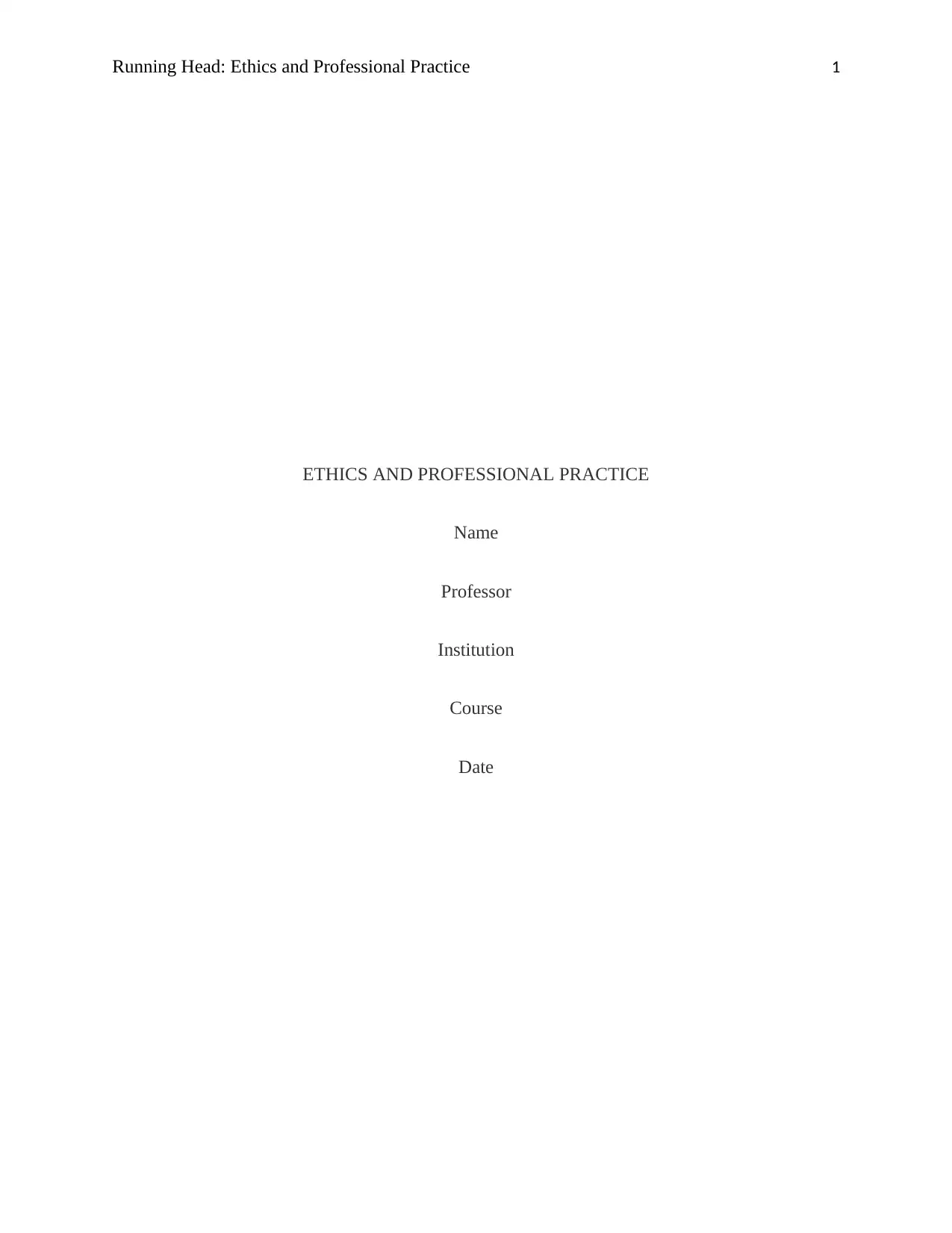
Running Head: Ethics and Professional Practice 1
ETHICS AND PROFESSIONAL PRACTICE
Name
Professor
Institution
Course
Date
ETHICS AND PROFESSIONAL PRACTICE
Name
Professor
Institution
Course
Date
Paraphrase This Document
Need a fresh take? Get an instant paraphrase of this document with our AI Paraphraser
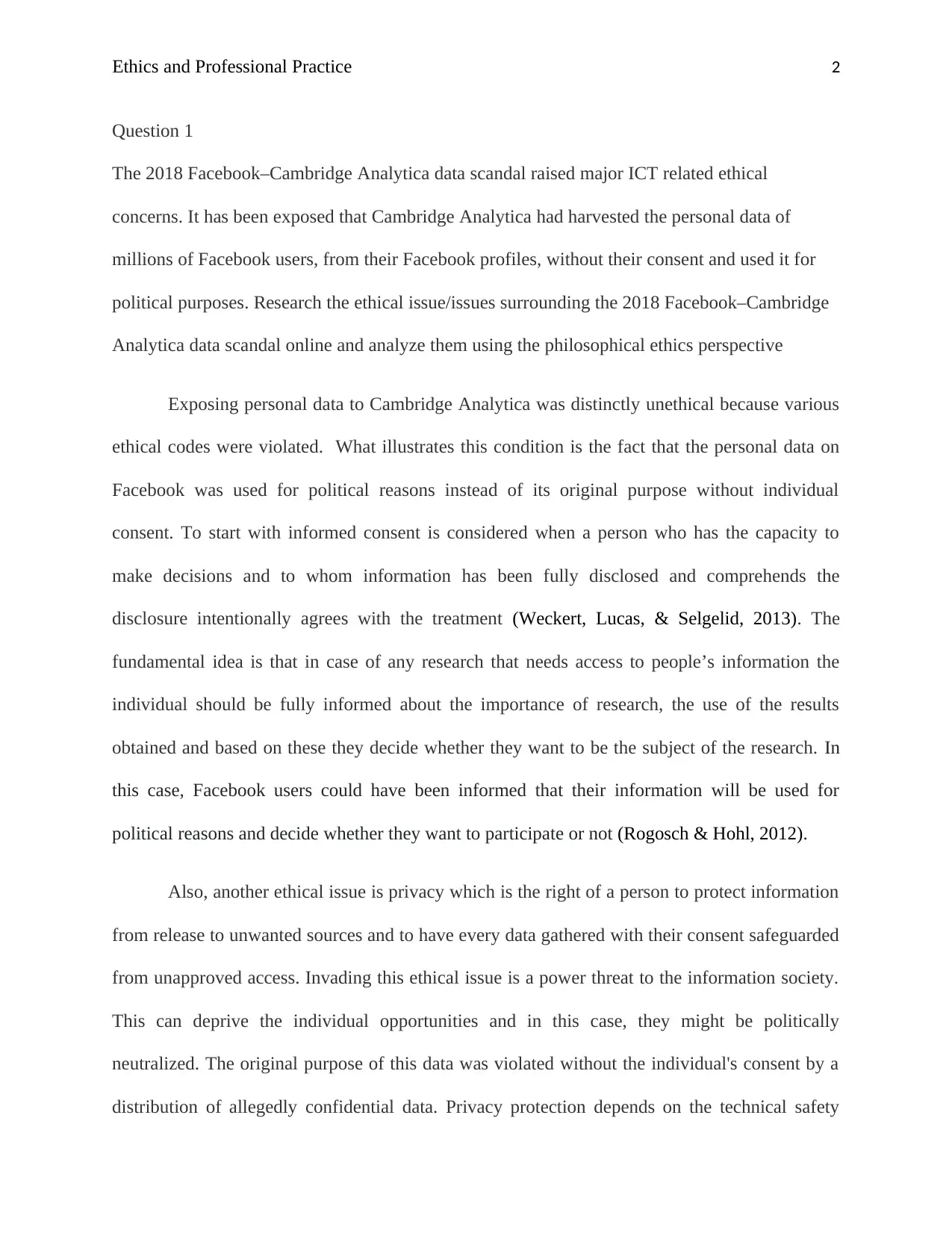
Ethics and Professional Practice 2
Question 1
The 2018 Facebook–Cambridge Analytica data scandal raised major ICT related ethical
concerns. It has been exposed that Cambridge Analytica had harvested the personal data of
millions of Facebook users, from their Facebook profiles, without their consent and used it for
political purposes. Research the ethical issue/issues surrounding the 2018 Facebook–Cambridge
Analytica data scandal online and analyze them using the philosophical ethics perspective
Exposing personal data to Cambridge Analytica was distinctly unethical because various
ethical codes were violated. What illustrates this condition is the fact that the personal data on
Facebook was used for political reasons instead of its original purpose without individual
consent. To start with informed consent is considered when a person who has the capacity to
make decisions and to whom information has been fully disclosed and comprehends the
disclosure intentionally agrees with the treatment (Weckert, Lucas, & Selgelid, 2013). The
fundamental idea is that in case of any research that needs access to people’s information the
individual should be fully informed about the importance of research, the use of the results
obtained and based on these they decide whether they want to be the subject of the research. In
this case, Facebook users could have been informed that their information will be used for
political reasons and decide whether they want to participate or not (Rogosch & Hohl, 2012).
Also, another ethical issue is privacy which is the right of a person to protect information
from release to unwanted sources and to have every data gathered with their consent safeguarded
from unapproved access. Invading this ethical issue is a power threat to the information society.
This can deprive the individual opportunities and in this case, they might be politically
neutralized. The original purpose of this data was violated without the individual's consent by a
distribution of allegedly confidential data. Privacy protection depends on the technical safety
Question 1
The 2018 Facebook–Cambridge Analytica data scandal raised major ICT related ethical
concerns. It has been exposed that Cambridge Analytica had harvested the personal data of
millions of Facebook users, from their Facebook profiles, without their consent and used it for
political purposes. Research the ethical issue/issues surrounding the 2018 Facebook–Cambridge
Analytica data scandal online and analyze them using the philosophical ethics perspective
Exposing personal data to Cambridge Analytica was distinctly unethical because various
ethical codes were violated. What illustrates this condition is the fact that the personal data on
Facebook was used for political reasons instead of its original purpose without individual
consent. To start with informed consent is considered when a person who has the capacity to
make decisions and to whom information has been fully disclosed and comprehends the
disclosure intentionally agrees with the treatment (Weckert, Lucas, & Selgelid, 2013). The
fundamental idea is that in case of any research that needs access to people’s information the
individual should be fully informed about the importance of research, the use of the results
obtained and based on these they decide whether they want to be the subject of the research. In
this case, Facebook users could have been informed that their information will be used for
political reasons and decide whether they want to participate or not (Rogosch & Hohl, 2012).
Also, another ethical issue is privacy which is the right of a person to protect information
from release to unwanted sources and to have every data gathered with their consent safeguarded
from unapproved access. Invading this ethical issue is a power threat to the information society.
This can deprive the individual opportunities and in this case, they might be politically
neutralized. The original purpose of this data was violated without the individual's consent by a
distribution of allegedly confidential data. Privacy protection depends on the technical safety
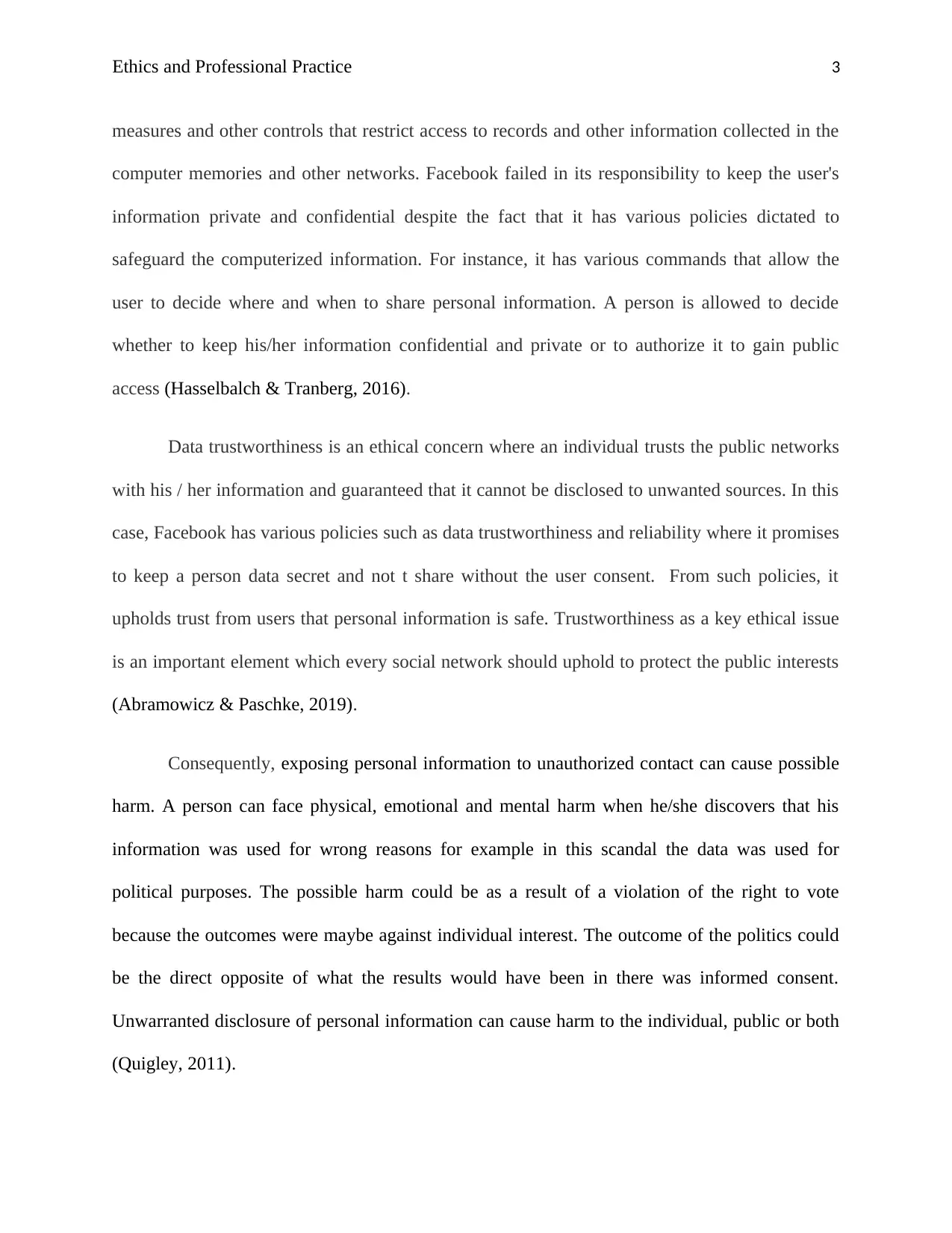
Ethics and Professional Practice 3
measures and other controls that restrict access to records and other information collected in the
computer memories and other networks. Facebook failed in its responsibility to keep the user's
information private and confidential despite the fact that it has various policies dictated to
safeguard the computerized information. For instance, it has various commands that allow the
user to decide where and when to share personal information. A person is allowed to decide
whether to keep his/her information confidential and private or to authorize it to gain public
access (Hasselbalch & Tranberg, 2016).
Data trustworthiness is an ethical concern where an individual trusts the public networks
with his / her information and guaranteed that it cannot be disclosed to unwanted sources. In this
case, Facebook has various policies such as data trustworthiness and reliability where it promises
to keep a person data secret and not t share without the user consent. From such policies, it
upholds trust from users that personal information is safe. Trustworthiness as a key ethical issue
is an important element which every social network should uphold to protect the public interests
(Abramowicz & Paschke, 2019).
Consequently, exposing personal information to unauthorized contact can cause possible
harm. A person can face physical, emotional and mental harm when he/she discovers that his
information was used for wrong reasons for example in this scandal the data was used for
political purposes. The possible harm could be as a result of a violation of the right to vote
because the outcomes were maybe against individual interest. The outcome of the politics could
be the direct opposite of what the results would have been in there was informed consent.
Unwarranted disclosure of personal information can cause harm to the individual, public or both
(Quigley, 2011).
measures and other controls that restrict access to records and other information collected in the
computer memories and other networks. Facebook failed in its responsibility to keep the user's
information private and confidential despite the fact that it has various policies dictated to
safeguard the computerized information. For instance, it has various commands that allow the
user to decide where and when to share personal information. A person is allowed to decide
whether to keep his/her information confidential and private or to authorize it to gain public
access (Hasselbalch & Tranberg, 2016).
Data trustworthiness is an ethical concern where an individual trusts the public networks
with his / her information and guaranteed that it cannot be disclosed to unwanted sources. In this
case, Facebook has various policies such as data trustworthiness and reliability where it promises
to keep a person data secret and not t share without the user consent. From such policies, it
upholds trust from users that personal information is safe. Trustworthiness as a key ethical issue
is an important element which every social network should uphold to protect the public interests
(Abramowicz & Paschke, 2019).
Consequently, exposing personal information to unauthorized contact can cause possible
harm. A person can face physical, emotional and mental harm when he/she discovers that his
information was used for wrong reasons for example in this scandal the data was used for
political purposes. The possible harm could be as a result of a violation of the right to vote
because the outcomes were maybe against individual interest. The outcome of the politics could
be the direct opposite of what the results would have been in there was informed consent.
Unwarranted disclosure of personal information can cause harm to the individual, public or both
(Quigley, 2011).
⊘ This is a preview!⊘
Do you want full access?
Subscribe today to unlock all pages.

Trusted by 1+ million students worldwide
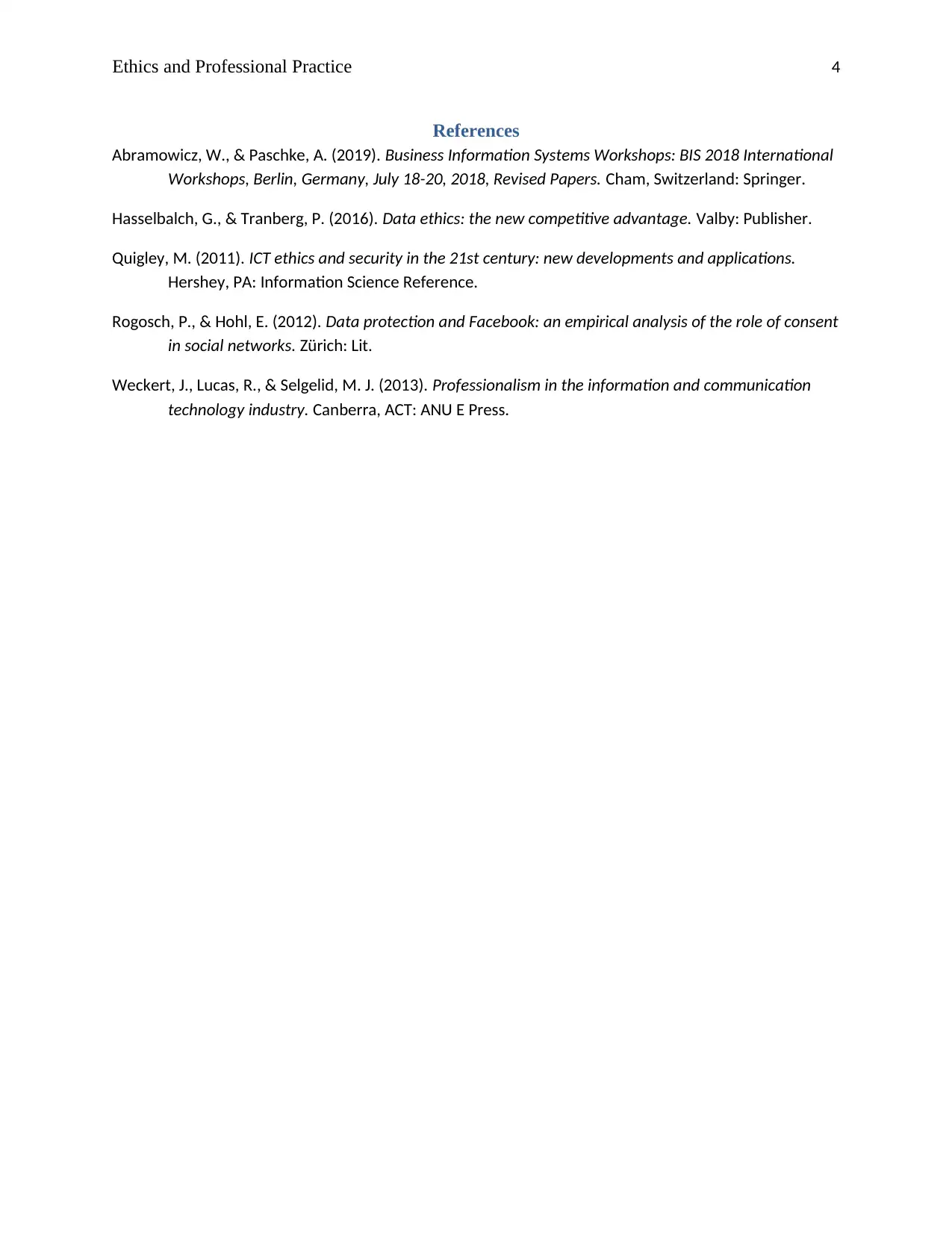
Ethics and Professional Practice 4
References
Abramowicz, W., & Paschke, A. (2019). Business Information Systems Workshops: BIS 2018 International
Workshops, Berlin, Germany, July 18-20, 2018, Revised Papers. Cham, Switzerland: Springer.
Hasselbalch, G., & Tranberg, P. (2016). Data ethics: the new competitive advantage. Valby: Publisher.
Quigley, M. (2011). ICT ethics and security in the 21st century: new developments and applications.
Hershey, PA: Information Science Reference.
Rogosch, P., & Hohl, E. (2012). Data protection and Facebook: an empirical analysis of the role of consent
in social networks. Zürich: Lit.
Weckert, J., Lucas, R., & Selgelid, M. J. (2013). Professionalism in the information and communication
technology industry. Canberra, ACT: ANU E Press.
References
Abramowicz, W., & Paschke, A. (2019). Business Information Systems Workshops: BIS 2018 International
Workshops, Berlin, Germany, July 18-20, 2018, Revised Papers. Cham, Switzerland: Springer.
Hasselbalch, G., & Tranberg, P. (2016). Data ethics: the new competitive advantage. Valby: Publisher.
Quigley, M. (2011). ICT ethics and security in the 21st century: new developments and applications.
Hershey, PA: Information Science Reference.
Rogosch, P., & Hohl, E. (2012). Data protection and Facebook: an empirical analysis of the role of consent
in social networks. Zürich: Lit.
Weckert, J., Lucas, R., & Selgelid, M. J. (2013). Professionalism in the information and communication
technology industry. Canberra, ACT: ANU E Press.
Paraphrase This Document
Need a fresh take? Get an instant paraphrase of this document with our AI Paraphraser
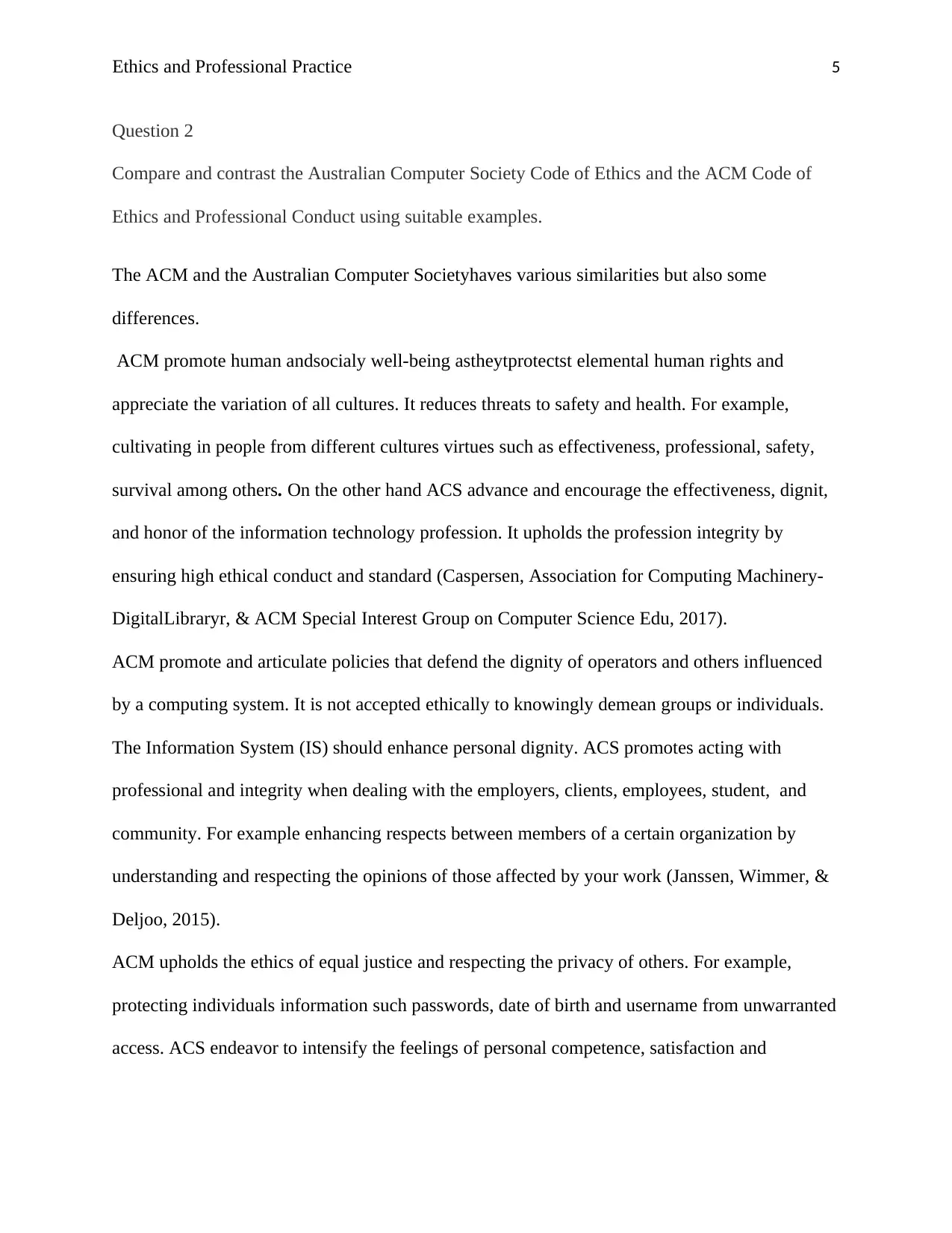
Ethics and Professional Practice 5
Question 2
Compare and contrast the Australian Computer Society Code of Ethics and the ACM Code of
Ethics and Professional Conduct using suitable examples.
The ACM and the Australian Computer Societyhaves various similarities but also some
differences.
ACM promote human andsocialy well-being astheytprotectst elemental human rights and
appreciate the variation of all cultures. It reduces threats to safety and health. For example,
cultivating in people from different cultures virtues such as effectiveness, professional, safety,
survival among others. On the other hand ACS advance and encourage the effectiveness, dignit,
and honor of the information technology profession. It upholds the profession integrity by
ensuring high ethical conduct and standard (Caspersen, Association for Computing Machinery-
DigitalLibraryr, & ACM Special Interest Group on Computer Science Edu, 2017).
ACM promote and articulate policies that defend the dignity of operators and others influenced
by a computing system. It is not accepted ethically to knowingly demean groups or individuals.
The Information System (IS) should enhance personal dignity. ACS promotes acting with
professional and integrity when dealing with the employers, clients, employees, student, and
community. For example enhancing respects between members of a certain organization by
understanding and respecting the opinions of those affected by your work (Janssen, Wimmer, &
Deljoo, 2015).
ACM upholds the ethics of equal justice and respecting the privacy of others. For example,
protecting individuals information such passwords, date of birth and username from unwarranted
access. ACS endeavor to intensify the feelings of personal competence, satisfaction and
Question 2
Compare and contrast the Australian Computer Society Code of Ethics and the ACM Code of
Ethics and Professional Conduct using suitable examples.
The ACM and the Australian Computer Societyhaves various similarities but also some
differences.
ACM promote human andsocialy well-being astheytprotectst elemental human rights and
appreciate the variation of all cultures. It reduces threats to safety and health. For example,
cultivating in people from different cultures virtues such as effectiveness, professional, safety,
survival among others. On the other hand ACS advance and encourage the effectiveness, dignit,
and honor of the information technology profession. It upholds the profession integrity by
ensuring high ethical conduct and standard (Caspersen, Association for Computing Machinery-
DigitalLibraryr, & ACM Special Interest Group on Computer Science Edu, 2017).
ACM promote and articulate policies that defend the dignity of operators and others influenced
by a computing system. It is not accepted ethically to knowingly demean groups or individuals.
The Information System (IS) should enhance personal dignity. ACS promotes acting with
professional and integrity when dealing with the employers, clients, employees, student, and
community. For example enhancing respects between members of a certain organization by
understanding and respecting the opinions of those affected by your work (Janssen, Wimmer, &
Deljoo, 2015).
ACM upholds the ethics of equal justice and respecting the privacy of others. For example,
protecting individuals information such passwords, date of birth and username from unwarranted
access. ACS endeavor to intensify the feelings of personal competence, satisfaction and
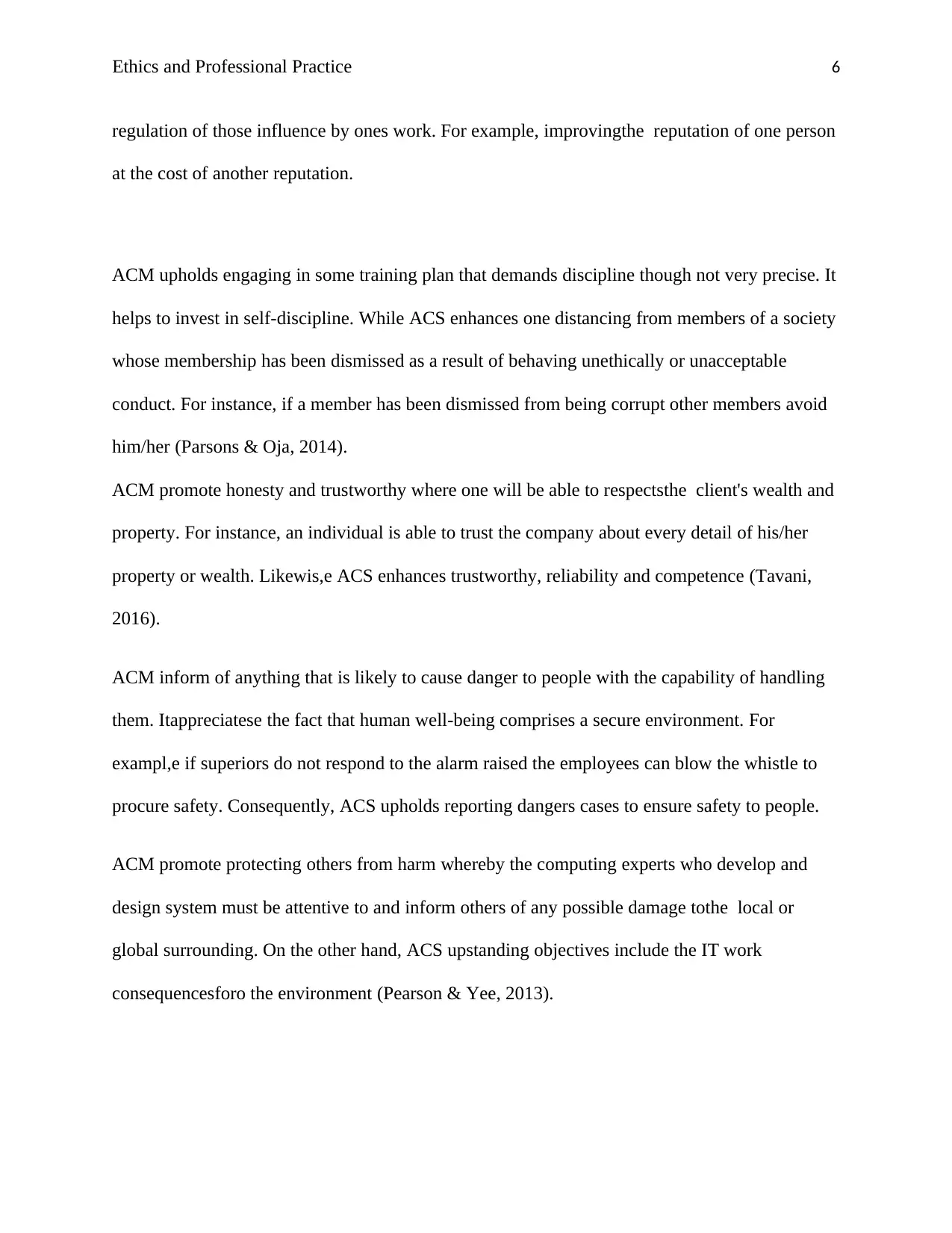
Ethics and Professional Practice 6
regulation of those influence by ones work. For example, improvingthe reputation of one person
at the cost of another reputation.
ACM upholds engaging in some training plan that demands discipline though not very precise. It
helps to invest in self-discipline. While ACS enhances one distancing from members of a society
whose membership has been dismissed as a result of behaving unethically or unacceptable
conduct. For instance, if a member has been dismissed from being corrupt other members avoid
him/her (Parsons & Oja, 2014).
ACM promote honesty and trustworthy where one will be able to respectsthe client's wealth and
property. For instance, an individual is able to trust the company about every detail of his/her
property or wealth. Likewis,e ACS enhances trustworthy, reliability and competence (Tavani,
2016).
ACM inform of anything that is likely to cause danger to people with the capability of handling
them. Itappreciatese the fact that human well-being comprises a secure environment. For
exampl,e if superiors do not respond to the alarm raised the employees can blow the whistle to
procure safety. Consequently, ACS upholds reporting dangers cases to ensure safety to people.
ACM promote protecting others from harm whereby the computing experts who develop and
design system must be attentive to and inform others of any possible damage tothe local or
global surrounding. On the other hand, ACS upstanding objectives include the IT work
consequencesforo the environment (Pearson & Yee, 2013).
regulation of those influence by ones work. For example, improvingthe reputation of one person
at the cost of another reputation.
ACM upholds engaging in some training plan that demands discipline though not very precise. It
helps to invest in self-discipline. While ACS enhances one distancing from members of a society
whose membership has been dismissed as a result of behaving unethically or unacceptable
conduct. For instance, if a member has been dismissed from being corrupt other members avoid
him/her (Parsons & Oja, 2014).
ACM promote honesty and trustworthy where one will be able to respectsthe client's wealth and
property. For instance, an individual is able to trust the company about every detail of his/her
property or wealth. Likewis,e ACS enhances trustworthy, reliability and competence (Tavani,
2016).
ACM inform of anything that is likely to cause danger to people with the capability of handling
them. Itappreciatese the fact that human well-being comprises a secure environment. For
exampl,e if superiors do not respond to the alarm raised the employees can blow the whistle to
procure safety. Consequently, ACS upholds reporting dangers cases to ensure safety to people.
ACM promote protecting others from harm whereby the computing experts who develop and
design system must be attentive to and inform others of any possible damage tothe local or
global surrounding. On the other hand, ACS upstanding objectives include the IT work
consequencesforo the environment (Pearson & Yee, 2013).
⊘ This is a preview!⊘
Do you want full access?
Subscribe today to unlock all pages.

Trusted by 1+ million students worldwide
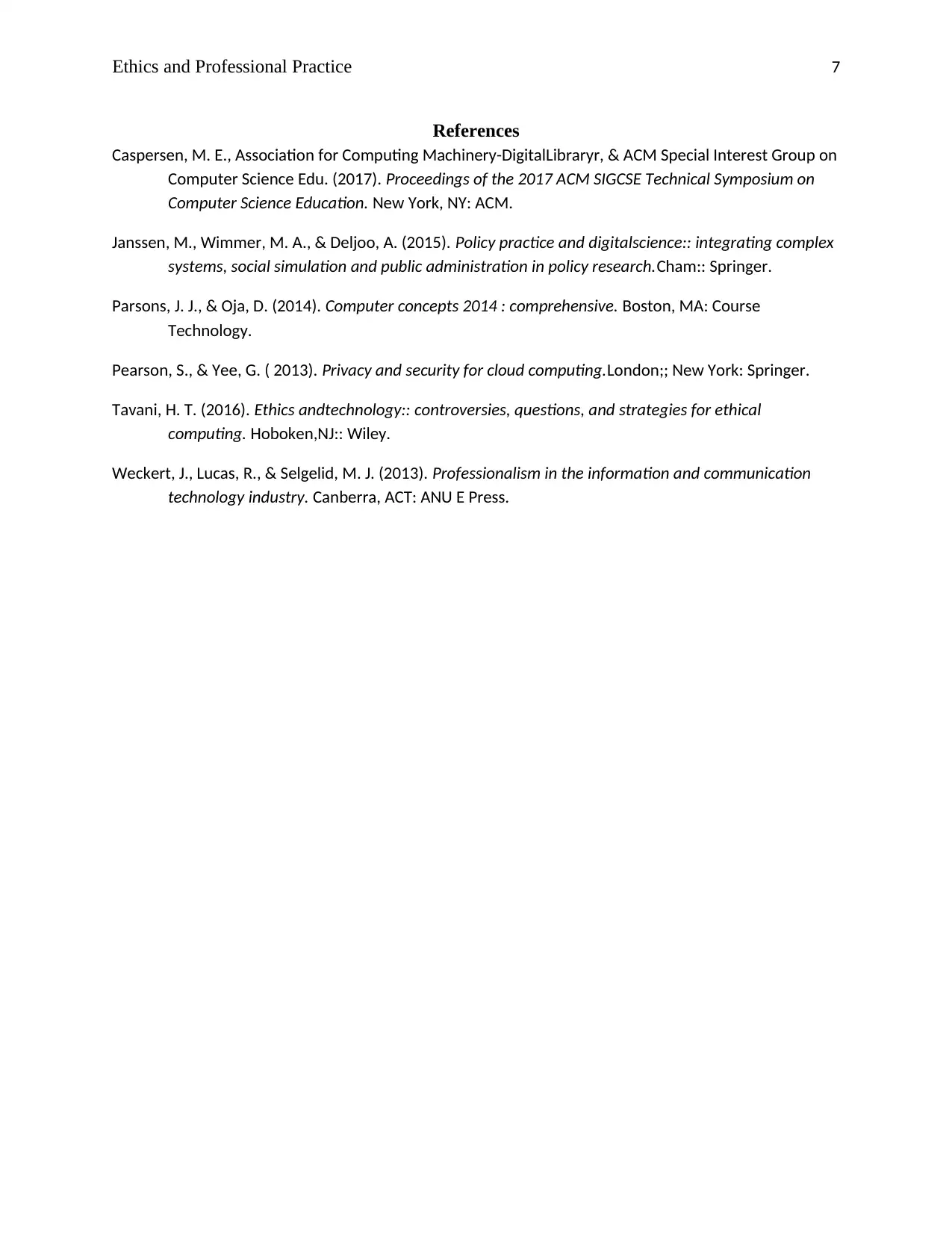
Ethics and Professional Practice 7
References
Caspersen, M. E., Association for Computing Machinery-DigitalLibraryr, & ACM Special Interest Group on
Computer Science Edu. (2017). Proceedings of the 2017 ACM SIGCSE Technical Symposium on
Computer Science Education. New York, NY: ACM.
Janssen, M., Wimmer, M. A., & Deljoo, A. (2015). Policy practice and digitalscience:: integrating complex
systems, social simulation and public administration in policy research.Cham:: Springer.
Parsons, J. J., & Oja, D. (2014). Computer concepts 2014 : comprehensive. Boston, MA: Course
Technology.
Pearson, S., & Yee, G. ( 2013). Privacy and security for cloud computing.London;; New York: Springer.
Tavani, H. T. (2016). Ethics andtechnology:: controversies, questions, and strategies for ethical
computing. Hoboken,NJ:: Wiley.
Weckert, J., Lucas, R., & Selgelid, M. J. (2013). Professionalism in the information and communication
technology industry. Canberra, ACT: ANU E Press.
References
Caspersen, M. E., Association for Computing Machinery-DigitalLibraryr, & ACM Special Interest Group on
Computer Science Edu. (2017). Proceedings of the 2017 ACM SIGCSE Technical Symposium on
Computer Science Education. New York, NY: ACM.
Janssen, M., Wimmer, M. A., & Deljoo, A. (2015). Policy practice and digitalscience:: integrating complex
systems, social simulation and public administration in policy research.Cham:: Springer.
Parsons, J. J., & Oja, D. (2014). Computer concepts 2014 : comprehensive. Boston, MA: Course
Technology.
Pearson, S., & Yee, G. ( 2013). Privacy and security for cloud computing.London;; New York: Springer.
Tavani, H. T. (2016). Ethics andtechnology:: controversies, questions, and strategies for ethical
computing. Hoboken,NJ:: Wiley.
Weckert, J., Lucas, R., & Selgelid, M. J. (2013). Professionalism in the information and communication
technology industry. Canberra, ACT: ANU E Press.
Paraphrase This Document
Need a fresh take? Get an instant paraphrase of this document with our AI Paraphraser
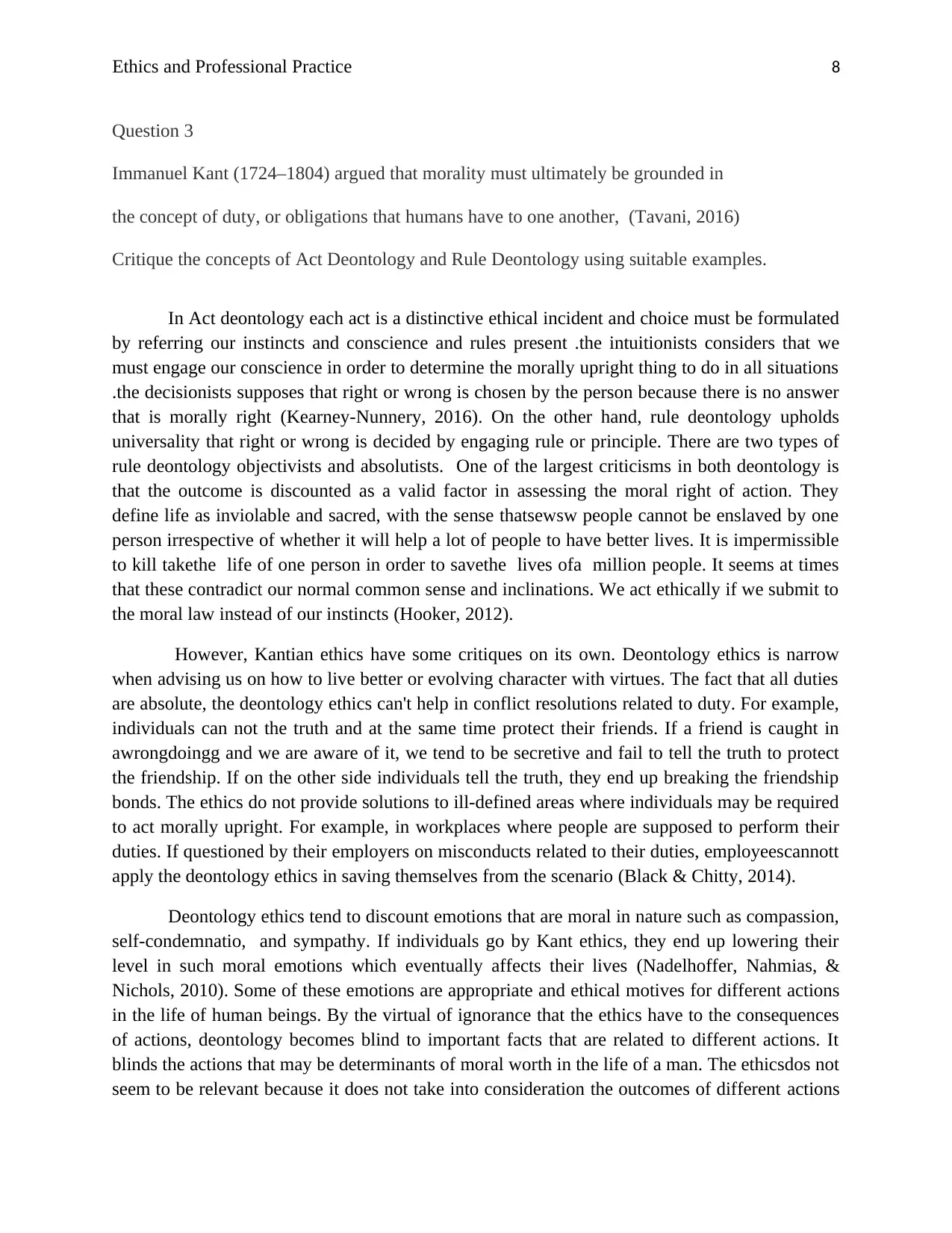
Ethics and Professional Practice 8
Question 3
Immanuel Kant (1724–1804) argued that morality must ultimately be grounded in
the concept of duty, or obligations that humans have to one another, (Tavani, 2016)
Critique the concepts of Act Deontology and Rule Deontology using suitable examples.
In Act deontology each act is a distinctive ethical incident and choice must be formulated
by referring our instincts and conscience and rules present .the intuitionists considers that we
must engage our conscience in order to determine the morally upright thing to do in all situations
.the decisionists supposes that right or wrong is chosen by the person because there is no answer
that is morally right (Kearney-Nunnery, 2016). On the other hand, rule deontology upholds
universality that right or wrong is decided by engaging rule or principle. There are two types of
rule deontology objectivists and absolutists. One of the largest criticisms in both deontology is
that the outcome is discounted as a valid factor in assessing the moral right of action. They
define life as inviolable and sacred, with the sense thatsewsw people cannot be enslaved by one
person irrespective of whether it will help a lot of people to have better lives. It is impermissible
to kill takethe life of one person in order to savethe lives ofa million people. It seems at times
that these contradict our normal common sense and inclinations. We act ethically if we submit to
the moral law instead of our instincts (Hooker, 2012).
However, Kantian ethics have some critiques on its own. Deontology ethics is narrow
when advising us on how to live better or evolving character with virtues. The fact that all duties
are absolute, the deontology ethics can't help in conflict resolutions related to duty. For example,
individuals can not the truth and at the same time protect their friends. If a friend is caught in
awrongdoingg and we are aware of it, we tend to be secretive and fail to tell the truth to protect
the friendship. If on the other side individuals tell the truth, they end up breaking the friendship
bonds. The ethics do not provide solutions to ill-defined areas where individuals may be required
to act morally upright. For example, in workplaces where people are supposed to perform their
duties. If questioned by their employers on misconducts related to their duties, employeescannott
apply the deontology ethics in saving themselves from the scenario (Black & Chitty, 2014).
Deontology ethics tend to discount emotions that are moral in nature such as compassion,
self-condemnatio, and sympathy. If individuals go by Kant ethics, they end up lowering their
level in such moral emotions which eventually affects their lives (Nadelhoffer, Nahmias, &
Nichols, 2010). Some of these emotions are appropriate and ethical motives for different actions
in the life of human beings. By the virtual of ignorance that the ethics have to the consequences
of actions, deontology becomes blind to important facts that are related to different actions. It
blinds the actions that may be determinants of moral worth in the life of a man. The ethicsdos not
seem to be relevant because it does not take into consideration the outcomes of different actions
Question 3
Immanuel Kant (1724–1804) argued that morality must ultimately be grounded in
the concept of duty, or obligations that humans have to one another, (Tavani, 2016)
Critique the concepts of Act Deontology and Rule Deontology using suitable examples.
In Act deontology each act is a distinctive ethical incident and choice must be formulated
by referring our instincts and conscience and rules present .the intuitionists considers that we
must engage our conscience in order to determine the morally upright thing to do in all situations
.the decisionists supposes that right or wrong is chosen by the person because there is no answer
that is morally right (Kearney-Nunnery, 2016). On the other hand, rule deontology upholds
universality that right or wrong is decided by engaging rule or principle. There are two types of
rule deontology objectivists and absolutists. One of the largest criticisms in both deontology is
that the outcome is discounted as a valid factor in assessing the moral right of action. They
define life as inviolable and sacred, with the sense thatsewsw people cannot be enslaved by one
person irrespective of whether it will help a lot of people to have better lives. It is impermissible
to kill takethe life of one person in order to savethe lives ofa million people. It seems at times
that these contradict our normal common sense and inclinations. We act ethically if we submit to
the moral law instead of our instincts (Hooker, 2012).
However, Kantian ethics have some critiques on its own. Deontology ethics is narrow
when advising us on how to live better or evolving character with virtues. The fact that all duties
are absolute, the deontology ethics can't help in conflict resolutions related to duty. For example,
individuals can not the truth and at the same time protect their friends. If a friend is caught in
awrongdoingg and we are aware of it, we tend to be secretive and fail to tell the truth to protect
the friendship. If on the other side individuals tell the truth, they end up breaking the friendship
bonds. The ethics do not provide solutions to ill-defined areas where individuals may be required
to act morally upright. For example, in workplaces where people are supposed to perform their
duties. If questioned by their employers on misconducts related to their duties, employeescannott
apply the deontology ethics in saving themselves from the scenario (Black & Chitty, 2014).
Deontology ethics tend to discount emotions that are moral in nature such as compassion,
self-condemnatio, and sympathy. If individuals go by Kant ethics, they end up lowering their
level in such moral emotions which eventually affects their lives (Nadelhoffer, Nahmias, &
Nichols, 2010). Some of these emotions are appropriate and ethical motives for different actions
in the life of human beings. By the virtual of ignorance that the ethics have to the consequences
of actions, deontology becomes blind to important facts that are related to different actions. It
blinds the actions that may be determinants of moral worth in the life of a man. The ethicsdos not
seem to be relevant because it does not take into consideration the outcomes of different actions
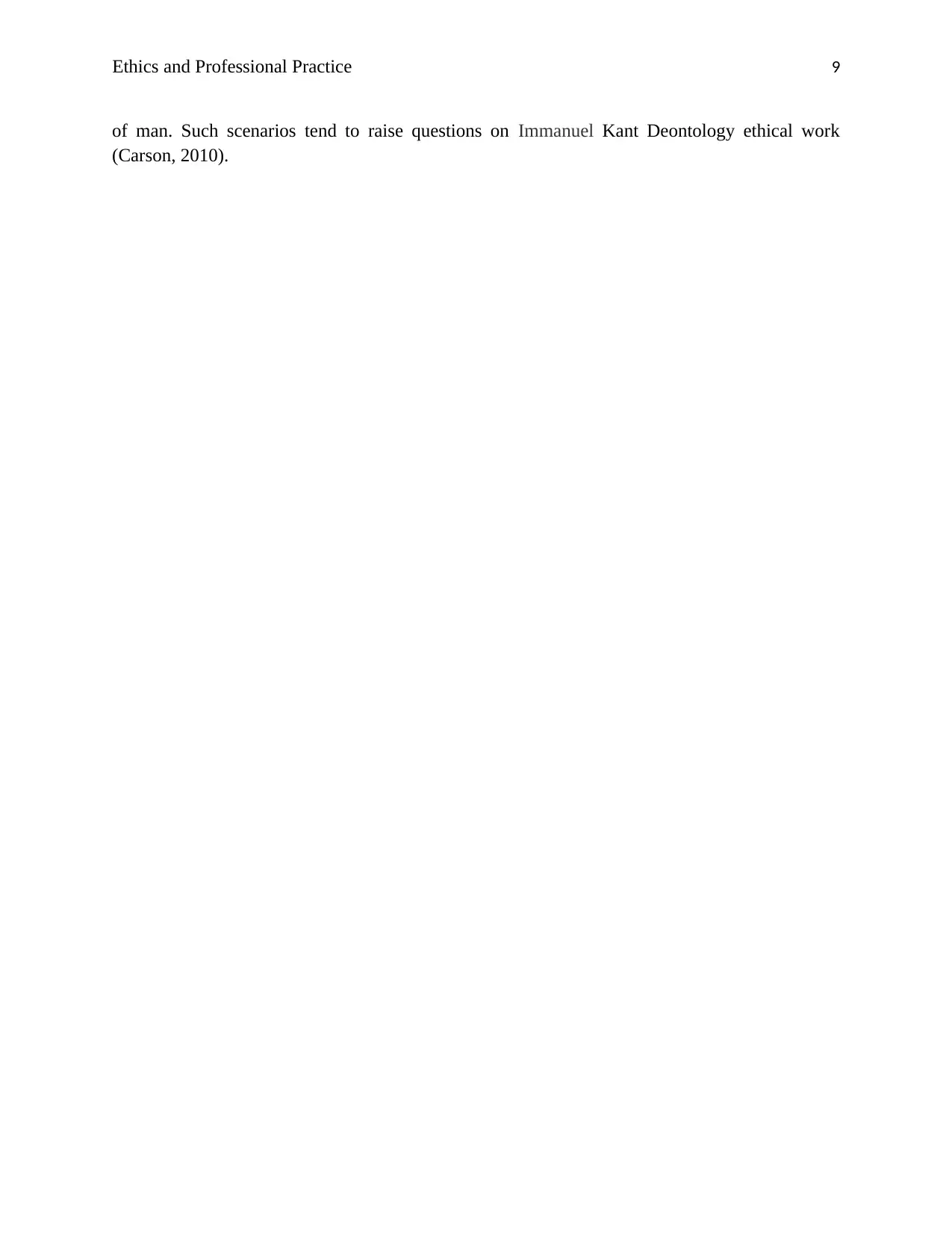
Ethics and Professional Practice 9
of man. Such scenarios tend to raise questions on Immanuel Kant Deontology ethical work
(Carson, 2010).
of man. Such scenarios tend to raise questions on Immanuel Kant Deontology ethical work
(Carson, 2010).
⊘ This is a preview!⊘
Do you want full access?
Subscribe today to unlock all pages.

Trusted by 1+ million students worldwide
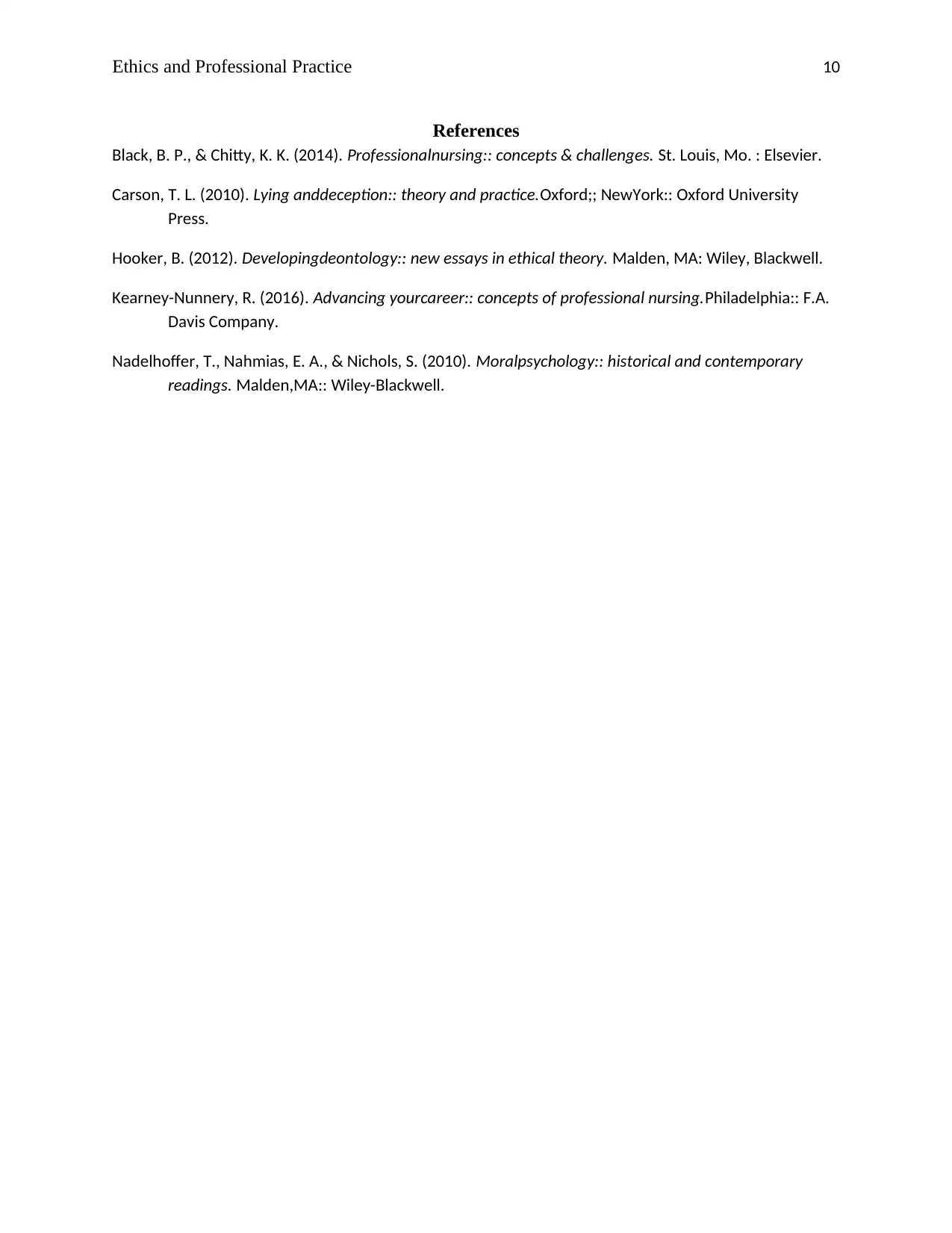
Ethics and Professional Practice 10
References
Black, B. P., & Chitty, K. K. (2014). Professionalnursing:: concepts & challenges. St. Louis, Mo. : Elsevier.
Carson, T. L. (2010). Lying anddeception:: theory and practice.Oxford;; NewYork:: Oxford University
Press.
Hooker, B. (2012). Developingdeontology:: new essays in ethical theory. Malden, MA: Wiley, Blackwell.
Kearney-Nunnery, R. (2016). Advancing yourcareer:: concepts of professional nursing.Philadelphia:: F.A.
Davis Company.
Nadelhoffer, T., Nahmias, E. A., & Nichols, S. (2010). Moralpsychology:: historical and contemporary
readings. Malden,MA:: Wiley-Blackwell.
References
Black, B. P., & Chitty, K. K. (2014). Professionalnursing:: concepts & challenges. St. Louis, Mo. : Elsevier.
Carson, T. L. (2010). Lying anddeception:: theory and practice.Oxford;; NewYork:: Oxford University
Press.
Hooker, B. (2012). Developingdeontology:: new essays in ethical theory. Malden, MA: Wiley, Blackwell.
Kearney-Nunnery, R. (2016). Advancing yourcareer:: concepts of professional nursing.Philadelphia:: F.A.
Davis Company.
Nadelhoffer, T., Nahmias, E. A., & Nichols, S. (2010). Moralpsychology:: historical and contemporary
readings. Malden,MA:: Wiley-Blackwell.
1 out of 10
Related Documents
Your All-in-One AI-Powered Toolkit for Academic Success.
+13062052269
info@desklib.com
Available 24*7 on WhatsApp / Email
![[object Object]](/_next/static/media/star-bottom.7253800d.svg)
Unlock your academic potential
Copyright © 2020–2026 A2Z Services. All Rights Reserved. Developed and managed by ZUCOL.





